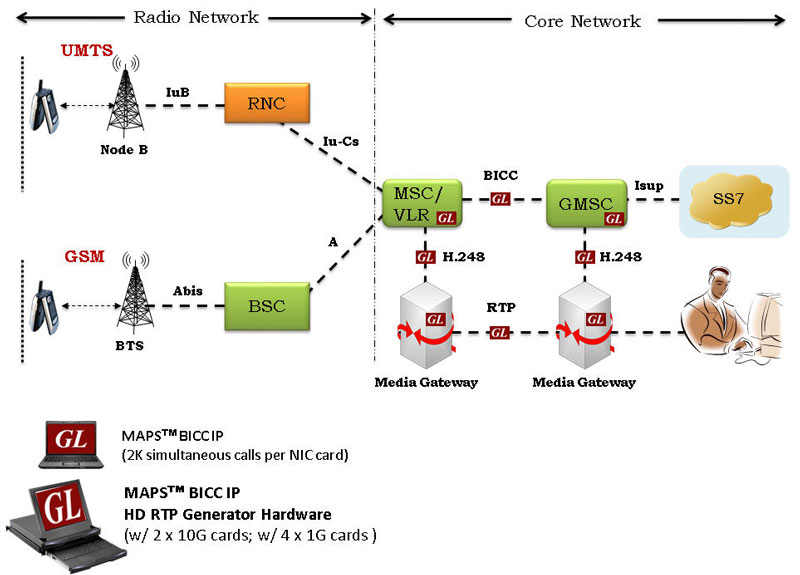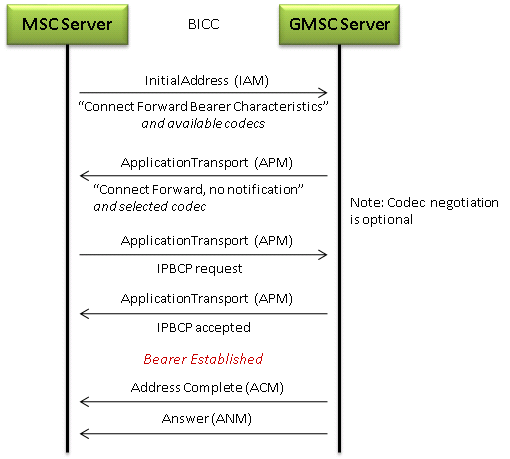Bearer Independent Call Control (BICC) Protocol Emulator
Welcome to another January, 2014 issue of GL Communications' Newsletter providing information and insight into our latest product MAPS™ BICC IP Emulator- Scripted Bearer Independent Call Control Protocol Emulation over IP.

Overview
The Bearer-Independent Call Control (BICC) is a signaling protocol based on ISUP that is used for supporting narrowband ISDN service over a broadband backbone network without interfering with interfaces to the existing network and end-to-end services. Specified by the ITU-T in recommendation Q.1901, BICC was designed to be compatible with existing networks and for that matter with any system that is capable of carrying voice messages.
MAPS™ BICC IP Emulator is used to emulate all the BICC interfaces over both TDM and IP. It is designed to specifically emulate BICC call control signaling as defined by ITU-T standards between Mobile Switching Center (MSC) and Gateway MSC (GMSC) server nodes.
MAPS™ BICC IP Emulator can run pre-defined test scenarios against test objects in a controlled & deterministic manner. In addition, it also supports error tracking, regression testing, conformance testing, load testing, and call generation. It supports powerful utilities like Message Editor, Script Editor, and Profile Editor which allow new scenarios to be created or existing scenarios to be modified using BICC IP call control messages and parameters.
GL's MAPS™ BICC IP Emulatorcurrently supports the following procedures emulating MSC (VLR), and GMSC entities in the network-
- Successful Basic Call procedure with enBloc and Overlap operation
- Setup procedures
- Mid Call Procedures
- Normal Call Release Procedures
- Unsuccessful call Setup
- Codec modification/mid-call Codec negotiation procedures
Supported Protocol Standards
| BICC over IP Protocol Stack | Supported Protocols | Standard / Specification Used |
|---|---|---|
 |
BICC |
ITU-T Q.1902 |
IPBCP |
RFC 2327 |
|
M3UA |
RFC 3332 |
|
SCTP |
RFC 4960 |
Main Features
- Emulate MSC and GMSC Nodes with BICC messages over IP
- User-friendly GUI for configuring the BICC IP Layers
- Supports BICC IP bearer control (call control or APM) messages
- Access to all BICC Call Control Message Parameters OPC, DPC, calling number, called number, and more
- Supports RTP traffic transmission and detection - digits, voice file, single /dual tones
- User-friendly GUI for configuring the M3UA Layers
- Load /Stress testing can be automated with different statistical distribution patterns for call generation
- Manual and Bulk calling can be automated with the scheduler and pre-saved configuration files
- Provides call reports with associated captured events and error events during call simulation
- Option to send reports to database accessible via web interface
- Supported on Windows® XP, Windows® 7 (32 bit and 64 bit) operating systems
Applications
- Multi-protocol, Multi-interface Simulation
- Provides fault insertion, and erroneous call flows testing capability
- Ready scripts makes testing procedure simpler, less time consuming and hence time to market products.
- Test response of network against protocol message modification, or corruption
- Inter-operability testing of networks
Typical BICC Call Flow Scenario
Shown below is a simple call procedure in GSM/UMTS BICC over IP interface:

Call Generation
Call Generation option allows the user to simulate outgoing communications where an outgoing call is initiated by sending call control messages using proper scripts and profiles. The profile allows necessary parameters of call control messages to be changed during runtime.
The screenshot below shows MAPS™ acting as MSC/VLR and sending the Initial Address message to GMSC. The Tx script also ensures that once the call is established auto traffic with voice file transmission is initiated.
Call Reception
Call generated from other entity can be automatically detected in call reception window by pre-setting the required scripts in the Incoming Call Handler window.
The screenshot below shows MAPS™ acting as GMSC node and responding to the Initial Address message from MSC.
Call Statistics
By default, all call handling scripts (irrespective of the type of the functions) are assessed by MAPS™ to provide statistical information about Total Calls, Active Calls, Completed Calls, Passed Calls, Failed Calls, and Calls/Sec. It is also possible to characterize the statistical information under different groups of call handling scripts under a unique heading. The enhanced Message Stats feature provides the count of protocol messages transmitted and received during the call, thus allowing users to monitor the real-time events. In addition, Call Generation and Call Reception windows provide useful call status & script execution results.



 Back to Newsletter Index Page
Back to Newsletter Index Page